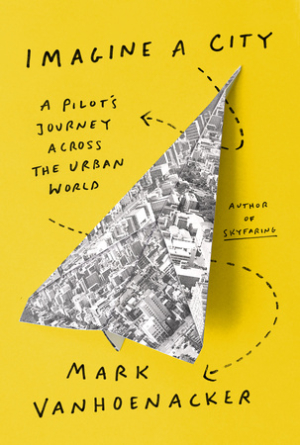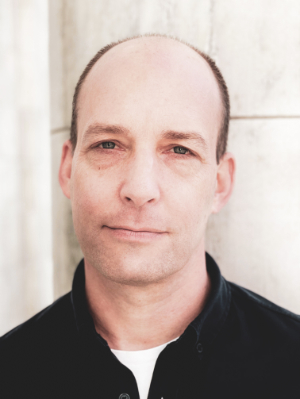
The book is structured in introspective vignettes reported from various cities, recalling the logbook of a globe-circling pilot. It is far more personal than his first book: For all of its beautiful vignettes about Tokyo, Dubai, Delhi, Cape Town and Seoul, Imagine a City always circles, like a jetliner awaiting permission to land, his hometown of Pittsfield, Mass., to which the book is dedicated.
As a child in Pittsfield, Vanhoenacker first dreamed that “real life” must exist somewhere else. He imagined an ideal city to visit “when I’m sad or worried, or when I don’t wish to think about what I don’t like about myself, such as the fact that I’m unable to pronounce the letter r, and therefore many words, including my own name. It’s also where I go when I want to escape my dawning awareness that I’m gay.” His father has told him about a real place—Brazil—where h sounds replace r sounds: “So there are places, I think, that I could choose to go to as soon as I grow up; there are cities where speech and life will be effortless.”

Imagine a City: A Pilot’s Journey Across the Urban World
By Mark Vanhoenacker ’96
Knopf

Vanhoenacker managed to transport himself not just elsewhere, but nearly everywhere. In writing about his travels, his project is to let his impressive intelligence and curiosity expand into discursions on history, science, language, architecture and art. The snows of Sapporo, Japan, for example, elicit several paragraphs on the molecular structure of a snowflake.
The lesson that all wanderers must learn is the true meaning of the koan “Wherever you go, there you are,” which is that there is no escaping the self. No matter where the narrative turns, the emotional core of Imagine a City is Vanhoenacker’s relationships with his friends and family, living and dead. (It’s our relationships, of course, that provide us with what we call our “baggage,” which we carry with us to all the cities of our lives.) Of one interaction with a male friend during his closeted teen years, he writes, “I tell him about my parents and their separation, and my hopes of going to Japan next summer. It’s easier for me to think of going so far, I tell him, because, actually, I don’t have a girlfriend at the moment, and anyway, I can’t wait to leave Pittsfield for good. He gestures—to indicate all of Pittsfield or only these Lakeside trees, I’m not sure—and tells me that leaving isn’t everything, and that he’s happy we are here.”
While experiencing white-knuckle turbulence in a passenger seat on an airliner, this reviewer is not the first person to draw for himself, as the drinks cart bounces and more skittish passengers start to yip, an imagined sketch of the pilot of the plane. Surely, we might reassure ourselves, the person who has our lives in their hands is intelligent, experienced, analytical, perhaps even steely. Vanhoenacker is all of those things, but he also possesses a quality even more rare: the heart of a poet.
One of the friends who appears in his pages is the poet Kirun Kapur ’97, who introduced him to Anne Sexton’s poem about Icarus and flight. Vanhoenacker writes, “Kirun knows me well, I thought, as I read: ‘larger than a sail, over the fog and the blast / of the plushy ocean, he goes.’’’ The descriptions in Imagine a City are as detailed and precise as a chart depicting the wind conditions over Kuwait. But it’s the author’s remarkable capacity for grace and mystery that lifts this book into more rarefied air.
Mancusi is a fiction writer and cultural critic. His debut novel, A Philosophy of Ruin, was published in 2019.
Illustration by Weitong Mai